Comparing Characteristics and Roles of Leaders and Managers
VerifiedAdded on 2021/02/19
|15
|3961
|25
Report
AI Summary
This report provides a comprehensive comparison between leaders and managers, examining their distinct characteristics and roles within an organizational context, using Corus as a case study. The report details the responsibilities of both leaders and managers, highlighting their contributions to achieving organizational goals and objectives. It analyzes how leaders motivate employees while managers create effective working environments. The report further explores situational applications of leadership and management, including conflict resolution and job satisfaction, and applies various leadership theories such as System, Situational, and Contingency leadership. The analysis underscores the importance of both leadership and management in fostering a positive and productive workplace, and in driving organizational success.
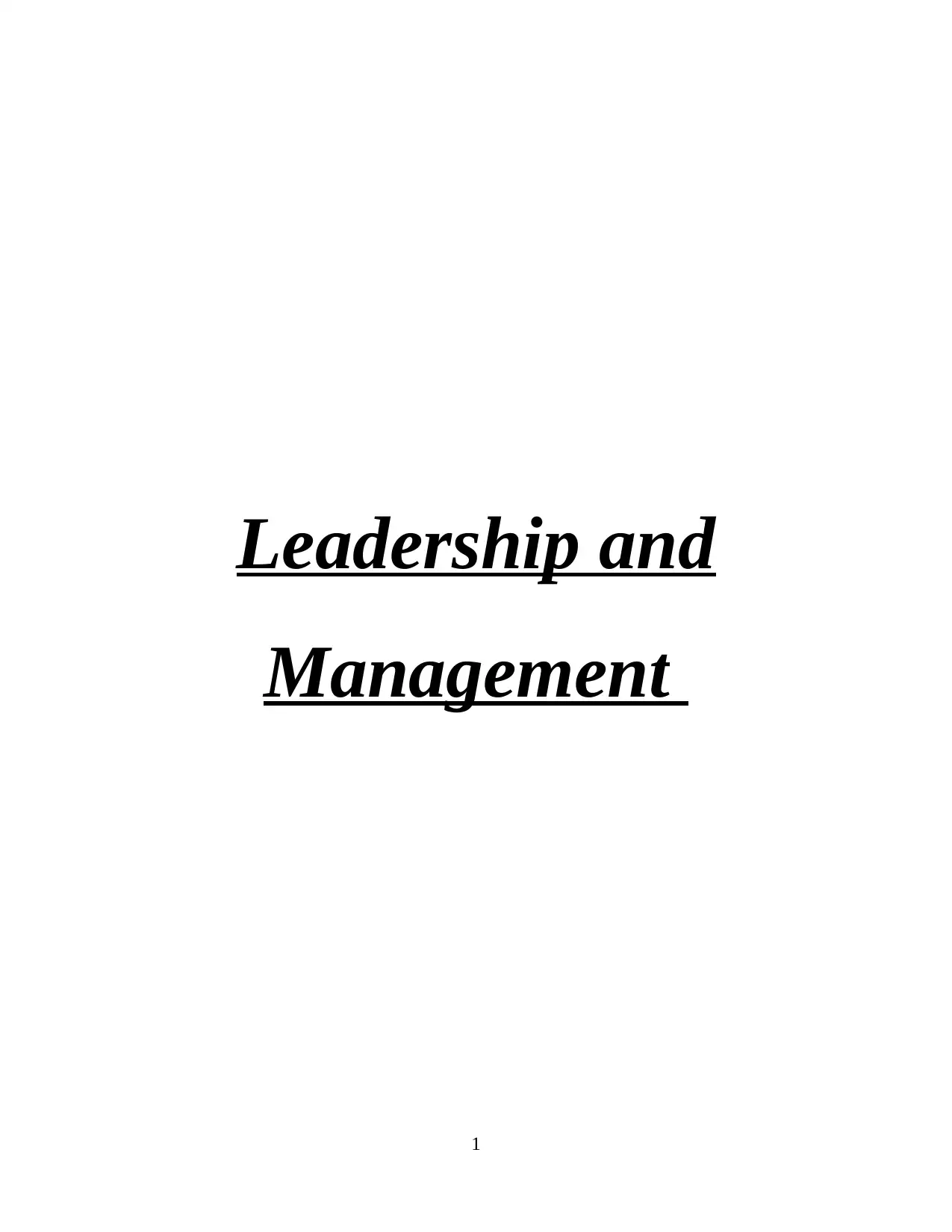
Leadership and
Management
1
Management
1
Paraphrase This Document
Need a fresh take? Get an instant paraphrase of this document with our AI Paraphraser
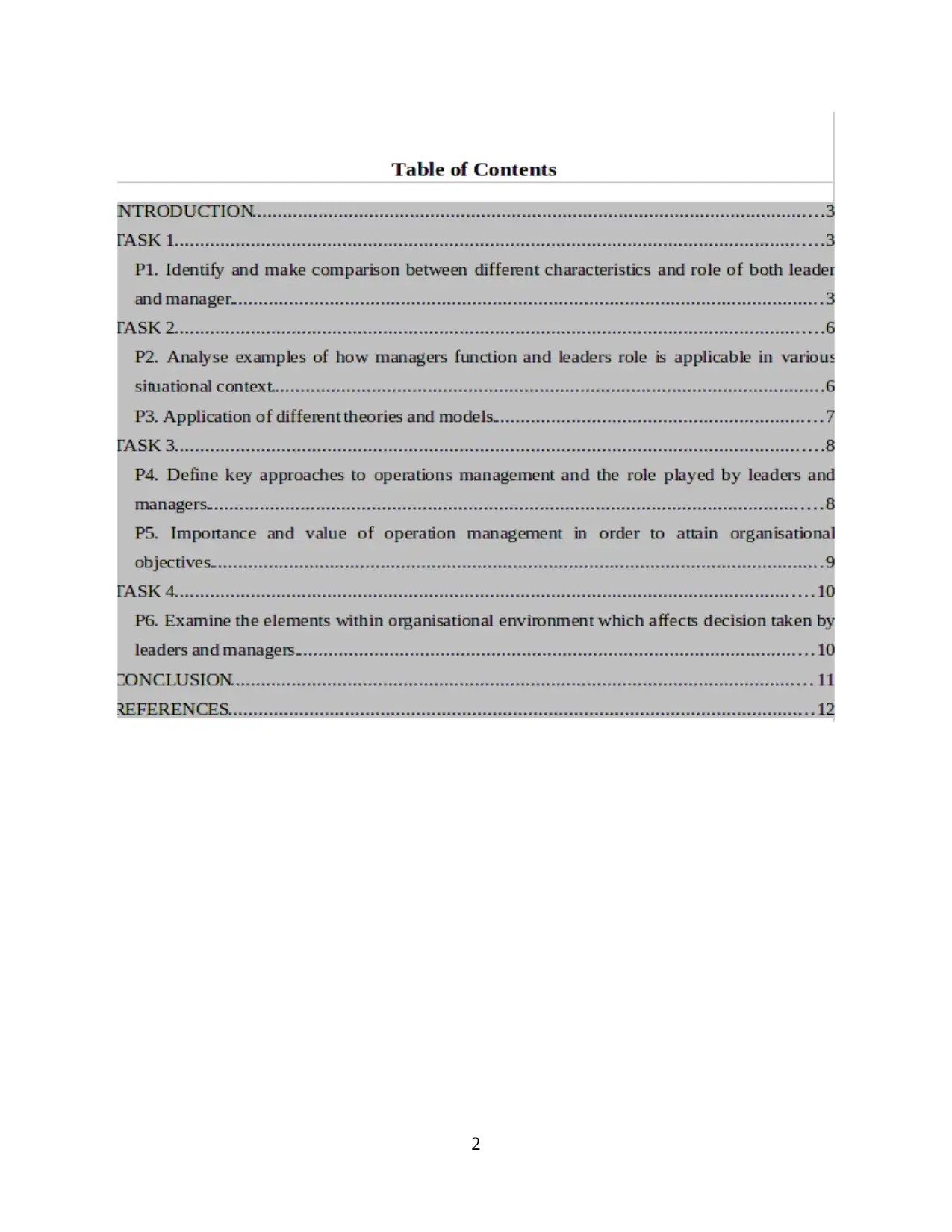
2
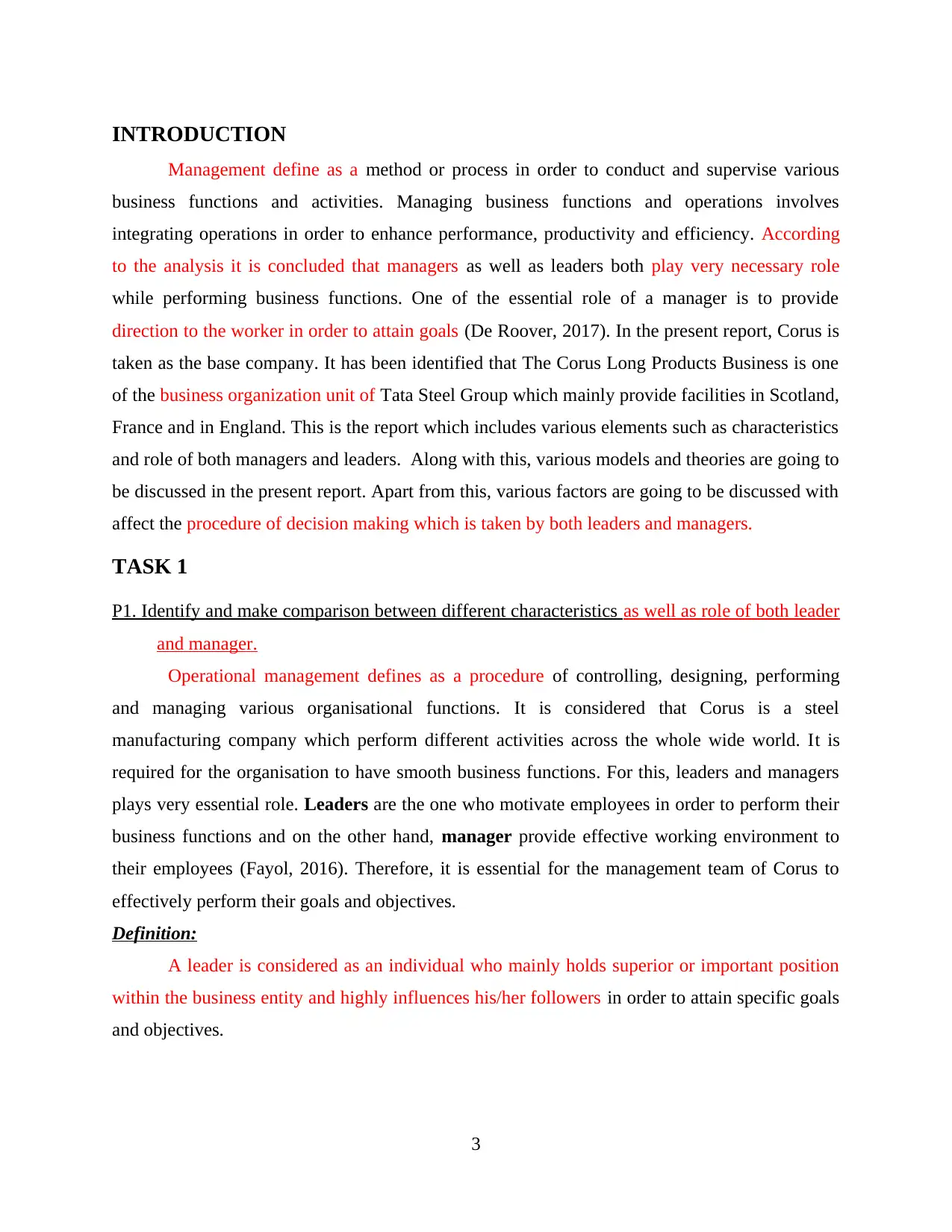
INTRODUCTION
Management define as a method or process in order to conduct and supervise various
business functions and activities. Managing business functions and operations involves
integrating operations in order to enhance performance, productivity and efficiency. According
to the analysis it is concluded that managers as well as leaders both play very necessary role
while performing business functions. One of the essential role of a manager is to provide
direction to the worker in order to attain goals (De Roover, 2017). In the present report, Corus is
taken as the base company. It has been identified that The Corus Long Products Business is one
of the business organization unit of Tata Steel Group which mainly provide facilities in Scotland,
France and in England. This is the report which includes various elements such as characteristics
and role of both managers and leaders. Along with this, various models and theories are going to
be discussed in the present report. Apart from this, various factors are going to be discussed with
affect the procedure of decision making which is taken by both leaders and managers.
TASK 1
P1. Identify and make comparison between different characteristics as well as role of both leader
and manager.
Operational management defines as a procedure of controlling, designing, performing
and managing various organisational functions. It is considered that Corus is a steel
manufacturing company which perform different activities across the whole wide world. It is
required for the organisation to have smooth business functions. For this, leaders and managers
plays very essential role. Leaders are the one who motivate employees in order to perform their
business functions and on the other hand, manager provide effective working environment to
their employees (Fayol, 2016). Therefore, it is essential for the management team of Corus to
effectively perform their goals and objectives.
Definition:
A leader is considered as an individual who mainly holds superior or important position
within the business entity and highly influences his/her followers in order to attain specific goals
and objectives.
3
Management define as a method or process in order to conduct and supervise various
business functions and activities. Managing business functions and operations involves
integrating operations in order to enhance performance, productivity and efficiency. According
to the analysis it is concluded that managers as well as leaders both play very necessary role
while performing business functions. One of the essential role of a manager is to provide
direction to the worker in order to attain goals (De Roover, 2017). In the present report, Corus is
taken as the base company. It has been identified that The Corus Long Products Business is one
of the business organization unit of Tata Steel Group which mainly provide facilities in Scotland,
France and in England. This is the report which includes various elements such as characteristics
and role of both managers and leaders. Along with this, various models and theories are going to
be discussed in the present report. Apart from this, various factors are going to be discussed with
affect the procedure of decision making which is taken by both leaders and managers.
TASK 1
P1. Identify and make comparison between different characteristics as well as role of both leader
and manager.
Operational management defines as a procedure of controlling, designing, performing
and managing various organisational functions. It is considered that Corus is a steel
manufacturing company which perform different activities across the whole wide world. It is
required for the organisation to have smooth business functions. For this, leaders and managers
plays very essential role. Leaders are the one who motivate employees in order to perform their
business functions and on the other hand, manager provide effective working environment to
their employees (Fayol, 2016). Therefore, it is essential for the management team of Corus to
effectively perform their goals and objectives.
Definition:
A leader is considered as an individual who mainly holds superior or important position
within the business entity and highly influences his/her followers in order to attain specific goals
and objectives.
3
⊘ This is a preview!⊘
Do you want full access?
Subscribe today to unlock all pages.

Trusted by 1+ million students worldwide
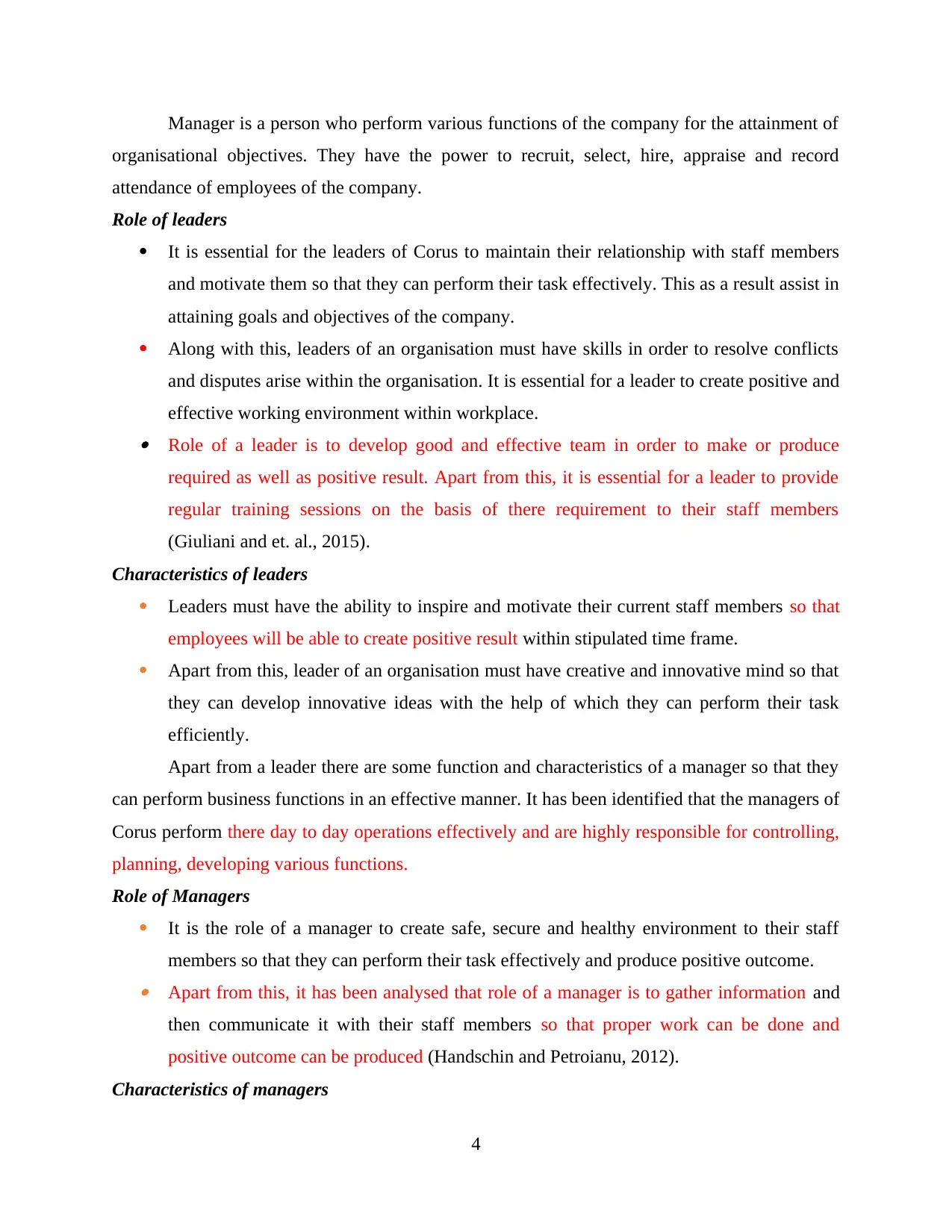
Manager is a person who perform various functions of the company for the attainment of
organisational objectives. They have the power to recruit, select, hire, appraise and record
attendance of employees of the company.
Role of leaders
It is essential for the leaders of Corus to maintain their relationship with staff members
and motivate them so that they can perform their task effectively. This as a result assist in
attaining goals and objectives of the company.
Along with this, leaders of an organisation must have skills in order to resolve conflicts
and disputes arise within the organisation. It is essential for a leader to create positive and
effective working environment within workplace. Role of a leader is to develop good and effective team in order to make or produce
required as well as positive result. Apart from this, it is essential for a leader to provide
regular training sessions on the basis of there requirement to their staff members
(Giuliani and et. al., 2015).
Characteristics of leaders
Leaders must have the ability to inspire and motivate their current staff members so that
employees will be able to create positive result within stipulated time frame.
Apart from this, leader of an organisation must have creative and innovative mind so that
they can develop innovative ideas with the help of which they can perform their task
efficiently.
Apart from a leader there are some function and characteristics of a manager so that they
can perform business functions in an effective manner. It has been identified that the managers of
Corus perform there day to day operations effectively and are highly responsible for controlling,
planning, developing various functions.
Role of Managers
It is the role of a manager to create safe, secure and healthy environment to their staff
members so that they can perform their task effectively and produce positive outcome. Apart from this, it has been analysed that role of a manager is to gather information and
then communicate it with their staff members so that proper work can be done and
positive outcome can be produced (Handschin and Petroianu, 2012).
Characteristics of managers
4
organisational objectives. They have the power to recruit, select, hire, appraise and record
attendance of employees of the company.
Role of leaders
It is essential for the leaders of Corus to maintain their relationship with staff members
and motivate them so that they can perform their task effectively. This as a result assist in
attaining goals and objectives of the company.
Along with this, leaders of an organisation must have skills in order to resolve conflicts
and disputes arise within the organisation. It is essential for a leader to create positive and
effective working environment within workplace. Role of a leader is to develop good and effective team in order to make or produce
required as well as positive result. Apart from this, it is essential for a leader to provide
regular training sessions on the basis of there requirement to their staff members
(Giuliani and et. al., 2015).
Characteristics of leaders
Leaders must have the ability to inspire and motivate their current staff members so that
employees will be able to create positive result within stipulated time frame.
Apart from this, leader of an organisation must have creative and innovative mind so that
they can develop innovative ideas with the help of which they can perform their task
efficiently.
Apart from a leader there are some function and characteristics of a manager so that they
can perform business functions in an effective manner. It has been identified that the managers of
Corus perform there day to day operations effectively and are highly responsible for controlling,
planning, developing various functions.
Role of Managers
It is the role of a manager to create safe, secure and healthy environment to their staff
members so that they can perform their task effectively and produce positive outcome. Apart from this, it has been analysed that role of a manager is to gather information and
then communicate it with their staff members so that proper work can be done and
positive outcome can be produced (Handschin and Petroianu, 2012).
Characteristics of managers
4
Paraphrase This Document
Need a fresh take? Get an instant paraphrase of this document with our AI Paraphraser
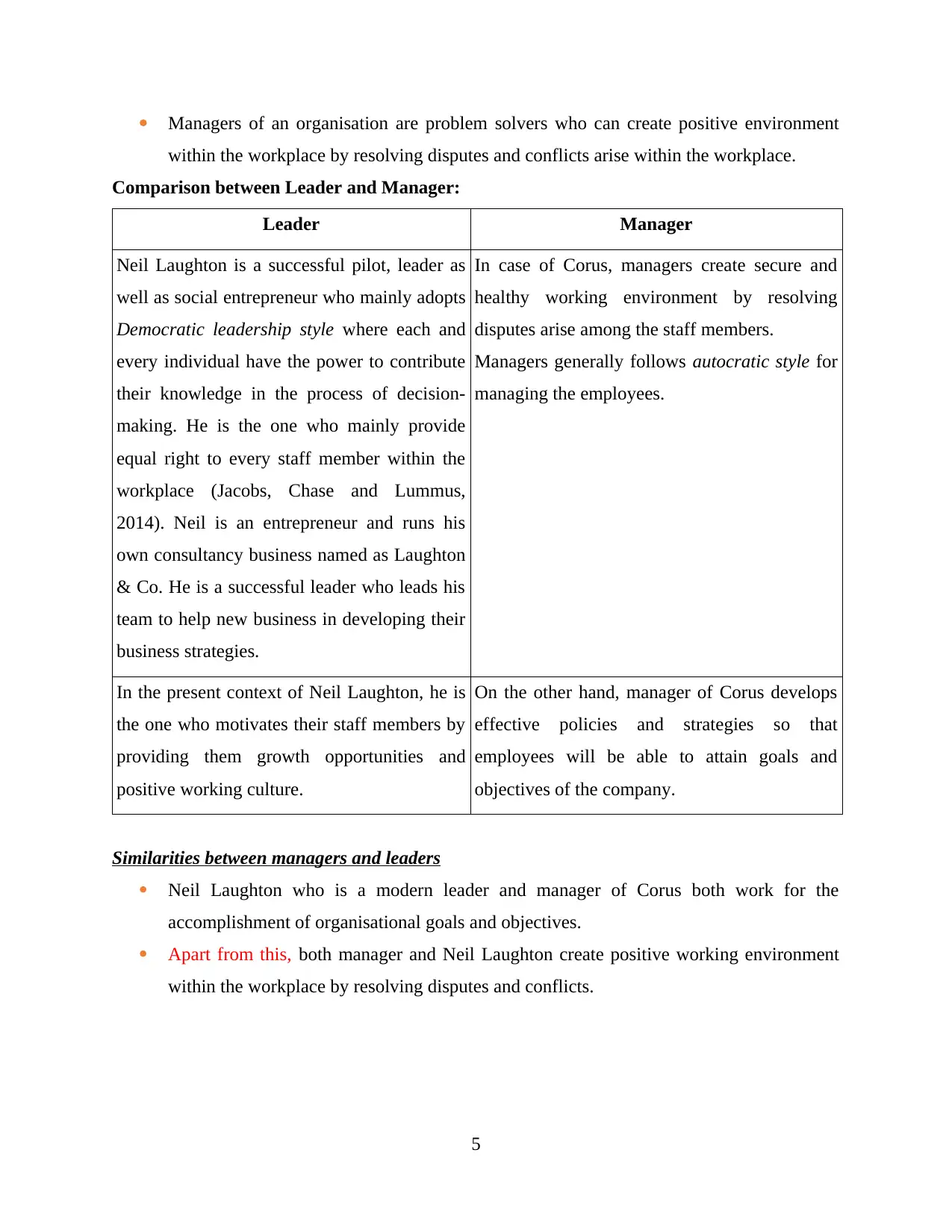
Managers of an organisation are problem solvers who can create positive environment
within the workplace by resolving disputes and conflicts arise within the workplace.
Comparison between Leader and Manager:
Leader Manager
Neil Laughton is a successful pilot, leader as
well as social entrepreneur who mainly adopts
Democratic leadership style where each and
every individual have the power to contribute
their knowledge in the process of decision-
making. He is the one who mainly provide
equal right to every staff member within the
workplace (Jacobs, Chase and Lummus,
2014). Neil is an entrepreneur and runs his
own consultancy business named as Laughton
& Co. He is a successful leader who leads his
team to help new business in developing their
business strategies.
In case of Corus, managers create secure and
healthy working environment by resolving
disputes arise among the staff members.
Managers generally follows autocratic style for
managing the employees.
In the present context of Neil Laughton, he is
the one who motivates their staff members by
providing them growth opportunities and
positive working culture.
On the other hand, manager of Corus develops
effective policies and strategies so that
employees will be able to attain goals and
objectives of the company.
Similarities between managers and leaders
Neil Laughton who is a modern leader and manager of Corus both work for the
accomplishment of organisational goals and objectives.
Apart from this, both manager and Neil Laughton create positive working environment
within the workplace by resolving disputes and conflicts.
5
within the workplace by resolving disputes and conflicts arise within the workplace.
Comparison between Leader and Manager:
Leader Manager
Neil Laughton is a successful pilot, leader as
well as social entrepreneur who mainly adopts
Democratic leadership style where each and
every individual have the power to contribute
their knowledge in the process of decision-
making. He is the one who mainly provide
equal right to every staff member within the
workplace (Jacobs, Chase and Lummus,
2014). Neil is an entrepreneur and runs his
own consultancy business named as Laughton
& Co. He is a successful leader who leads his
team to help new business in developing their
business strategies.
In case of Corus, managers create secure and
healthy working environment by resolving
disputes arise among the staff members.
Managers generally follows autocratic style for
managing the employees.
In the present context of Neil Laughton, he is
the one who motivates their staff members by
providing them growth opportunities and
positive working culture.
On the other hand, manager of Corus develops
effective policies and strategies so that
employees will be able to attain goals and
objectives of the company.
Similarities between managers and leaders
Neil Laughton who is a modern leader and manager of Corus both work for the
accomplishment of organisational goals and objectives.
Apart from this, both manager and Neil Laughton create positive working environment
within the workplace by resolving disputes and conflicts.
5
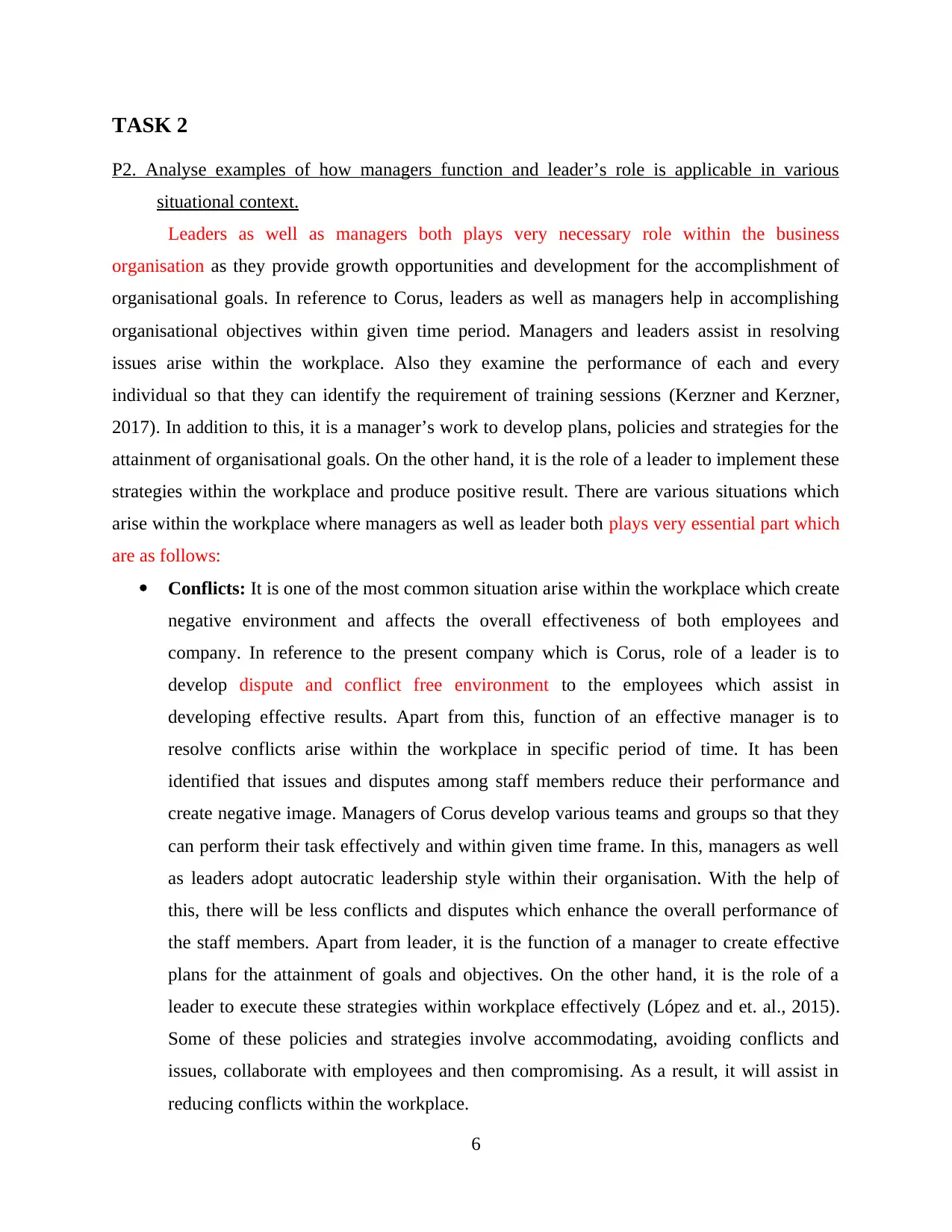
TASK 2
P2. Analyse examples of how managers function and leader’s role is applicable in various
situational context.
Leaders as well as managers both plays very necessary role within the business
organisation as they provide growth opportunities and development for the accomplishment of
organisational goals. In reference to Corus, leaders as well as managers help in accomplishing
organisational objectives within given time period. Managers and leaders assist in resolving
issues arise within the workplace. Also they examine the performance of each and every
individual so that they can identify the requirement of training sessions (Kerzner and Kerzner,
2017). In addition to this, it is a manager’s work to develop plans, policies and strategies for the
attainment of organisational goals. On the other hand, it is the role of a leader to implement these
strategies within the workplace and produce positive result. There are various situations which
arise within the workplace where managers as well as leader both plays very essential part which
are as follows:
Conflicts: It is one of the most common situation arise within the workplace which create
negative environment and affects the overall effectiveness of both employees and
company. In reference to the present company which is Corus, role of a leader is to
develop dispute and conflict free environment to the employees which assist in
developing effective results. Apart from this, function of an effective manager is to
resolve conflicts arise within the workplace in specific period of time. It has been
identified that issues and disputes among staff members reduce their performance and
create negative image. Managers of Corus develop various teams and groups so that they
can perform their task effectively and within given time frame. In this, managers as well
as leaders adopt autocratic leadership style within their organisation. With the help of
this, there will be less conflicts and disputes which enhance the overall performance of
the staff members. Apart from leader, it is the function of a manager to create effective
plans for the attainment of goals and objectives. On the other hand, it is the role of a
leader to execute these strategies within workplace effectively (López and et. al., 2015).
Some of these policies and strategies involve accommodating, avoiding conflicts and
issues, collaborate with employees and then compromising. As a result, it will assist in
reducing conflicts within the workplace.
6
P2. Analyse examples of how managers function and leader’s role is applicable in various
situational context.
Leaders as well as managers both plays very necessary role within the business
organisation as they provide growth opportunities and development for the accomplishment of
organisational goals. In reference to Corus, leaders as well as managers help in accomplishing
organisational objectives within given time period. Managers and leaders assist in resolving
issues arise within the workplace. Also they examine the performance of each and every
individual so that they can identify the requirement of training sessions (Kerzner and Kerzner,
2017). In addition to this, it is a manager’s work to develop plans, policies and strategies for the
attainment of organisational goals. On the other hand, it is the role of a leader to implement these
strategies within the workplace and produce positive result. There are various situations which
arise within the workplace where managers as well as leader both plays very essential part which
are as follows:
Conflicts: It is one of the most common situation arise within the workplace which create
negative environment and affects the overall effectiveness of both employees and
company. In reference to the present company which is Corus, role of a leader is to
develop dispute and conflict free environment to the employees which assist in
developing effective results. Apart from this, function of an effective manager is to
resolve conflicts arise within the workplace in specific period of time. It has been
identified that issues and disputes among staff members reduce their performance and
create negative image. Managers of Corus develop various teams and groups so that they
can perform their task effectively and within given time frame. In this, managers as well
as leaders adopt autocratic leadership style within their organisation. With the help of
this, there will be less conflicts and disputes which enhance the overall performance of
the staff members. Apart from leader, it is the function of a manager to create effective
plans for the attainment of goals and objectives. On the other hand, it is the role of a
leader to execute these strategies within workplace effectively (López and et. al., 2015).
Some of these policies and strategies involve accommodating, avoiding conflicts and
issues, collaborate with employees and then compromising. As a result, it will assist in
reducing conflicts within the workplace.
6
⊘ This is a preview!⊘
Do you want full access?
Subscribe today to unlock all pages.

Trusted by 1+ million students worldwide
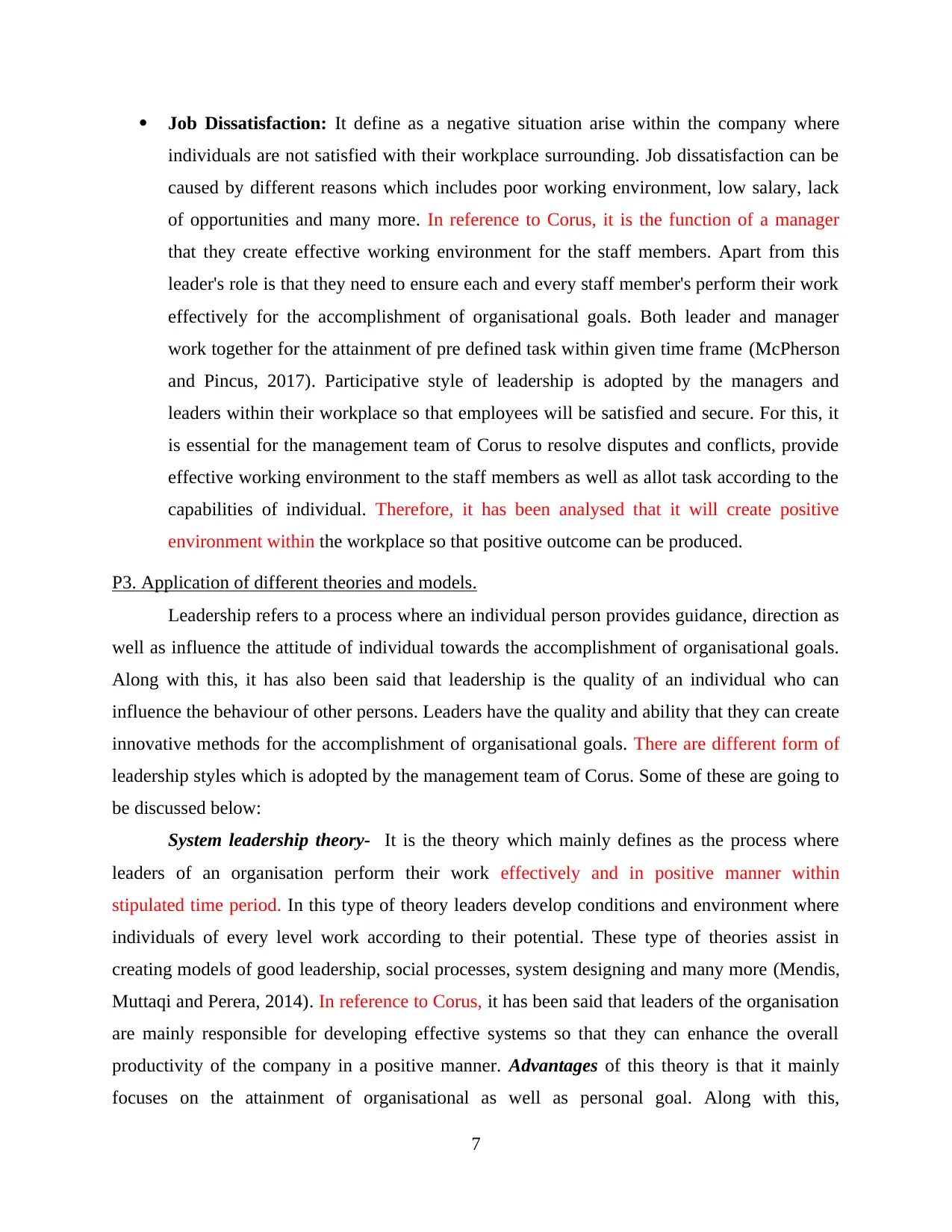
Job Dissatisfaction: It define as a negative situation arise within the company where
individuals are not satisfied with their workplace surrounding. Job dissatisfaction can be
caused by different reasons which includes poor working environment, low salary, lack
of opportunities and many more. In reference to Corus, it is the function of a manager
that they create effective working environment for the staff members. Apart from this
leader's role is that they need to ensure each and every staff member's perform their work
effectively for the accomplishment of organisational goals. Both leader and manager
work together for the attainment of pre defined task within given time frame (McPherson
and Pincus, 2017). Participative style of leadership is adopted by the managers and
leaders within their workplace so that employees will be satisfied and secure. For this, it
is essential for the management team of Corus to resolve disputes and conflicts, provide
effective working environment to the staff members as well as allot task according to the
capabilities of individual. Therefore, it has been analysed that it will create positive
environment within the workplace so that positive outcome can be produced.
P3. Application of different theories and models.
Leadership refers to a process where an individual person provides guidance, direction as
well as influence the attitude of individual towards the accomplishment of organisational goals.
Along with this, it has also been said that leadership is the quality of an individual who can
influence the behaviour of other persons. Leaders have the quality and ability that they can create
innovative methods for the accomplishment of organisational goals. There are different form of
leadership styles which is adopted by the management team of Corus. Some of these are going to
be discussed below:
System leadership theory- It is the theory which mainly defines as the process where
leaders of an organisation perform their work effectively and in positive manner within
stipulated time period. In this type of theory leaders develop conditions and environment where
individuals of every level work according to their potential. These type of theories assist in
creating models of good leadership, social processes, system designing and many more (Mendis,
Muttaqi and Perera, 2014). In reference to Corus, it has been said that leaders of the organisation
are mainly responsible for developing effective systems so that they can enhance the overall
productivity of the company in a positive manner. Advantages of this theory is that it mainly
focuses on the attainment of organisational as well as personal goal. Along with this,
7
individuals are not satisfied with their workplace surrounding. Job dissatisfaction can be
caused by different reasons which includes poor working environment, low salary, lack
of opportunities and many more. In reference to Corus, it is the function of a manager
that they create effective working environment for the staff members. Apart from this
leader's role is that they need to ensure each and every staff member's perform their work
effectively for the accomplishment of organisational goals. Both leader and manager
work together for the attainment of pre defined task within given time frame (McPherson
and Pincus, 2017). Participative style of leadership is adopted by the managers and
leaders within their workplace so that employees will be satisfied and secure. For this, it
is essential for the management team of Corus to resolve disputes and conflicts, provide
effective working environment to the staff members as well as allot task according to the
capabilities of individual. Therefore, it has been analysed that it will create positive
environment within the workplace so that positive outcome can be produced.
P3. Application of different theories and models.
Leadership refers to a process where an individual person provides guidance, direction as
well as influence the attitude of individual towards the accomplishment of organisational goals.
Along with this, it has also been said that leadership is the quality of an individual who can
influence the behaviour of other persons. Leaders have the quality and ability that they can create
innovative methods for the accomplishment of organisational goals. There are different form of
leadership styles which is adopted by the management team of Corus. Some of these are going to
be discussed below:
System leadership theory- It is the theory which mainly defines as the process where
leaders of an organisation perform their work effectively and in positive manner within
stipulated time period. In this type of theory leaders develop conditions and environment where
individuals of every level work according to their potential. These type of theories assist in
creating models of good leadership, social processes, system designing and many more (Mendis,
Muttaqi and Perera, 2014). In reference to Corus, it has been said that leaders of the organisation
are mainly responsible for developing effective systems so that they can enhance the overall
productivity of the company in a positive manner. Advantages of this theory is that it mainly
focuses on the attainment of organisational as well as personal goal. Along with this,
7
Paraphrase This Document
Need a fresh take? Get an instant paraphrase of this document with our AI Paraphraser
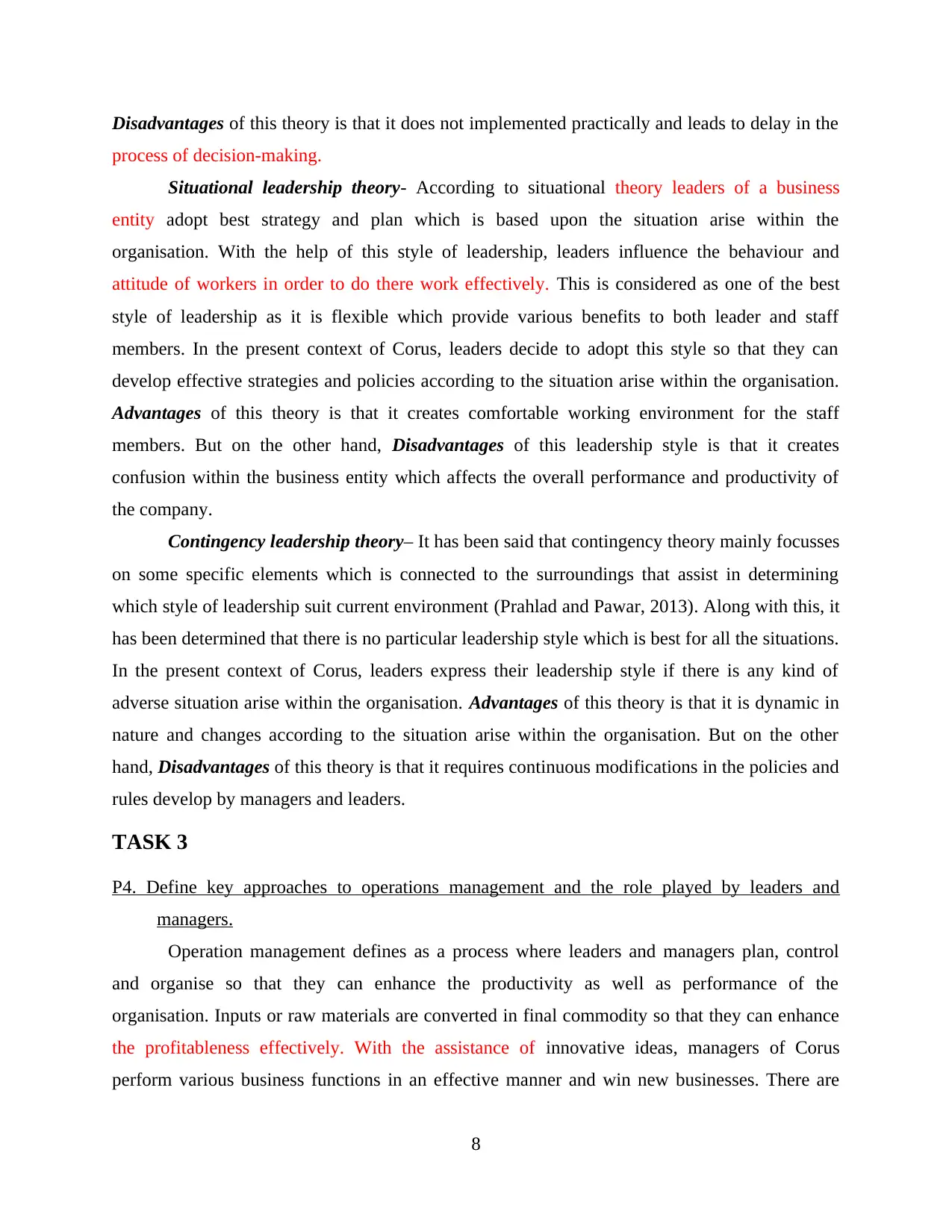
Disadvantages of this theory is that it does not implemented practically and leads to delay in the
process of decision-making.
Situational leadership theory- According to situational theory leaders of a business
entity adopt best strategy and plan which is based upon the situation arise within the
organisation. With the help of this style of leadership, leaders influence the behaviour and
attitude of workers in order to do there work effectively. This is considered as one of the best
style of leadership as it is flexible which provide various benefits to both leader and staff
members. In the present context of Corus, leaders decide to adopt this style so that they can
develop effective strategies and policies according to the situation arise within the organisation.
Advantages of this theory is that it creates comfortable working environment for the staff
members. But on the other hand, Disadvantages of this leadership style is that it creates
confusion within the business entity which affects the overall performance and productivity of
the company.
Contingency leadership theory– It has been said that contingency theory mainly focusses
on some specific elements which is connected to the surroundings that assist in determining
which style of leadership suit current environment (Prahlad and Pawar, 2013). Along with this, it
has been determined that there is no particular leadership style which is best for all the situations.
In the present context of Corus, leaders express their leadership style if there is any kind of
adverse situation arise within the organisation. Advantages of this theory is that it is dynamic in
nature and changes according to the situation arise within the organisation. But on the other
hand, Disadvantages of this theory is that it requires continuous modifications in the policies and
rules develop by managers and leaders.
TASK 3
P4. Define key approaches to operations management and the role played by leaders and
managers.
Operation management defines as a process where leaders and managers plan, control
and organise so that they can enhance the productivity as well as performance of the
organisation. Inputs or raw materials are converted in final commodity so that they can enhance
the profitableness effectively. With the assistance of innovative ideas, managers of Corus
perform various business functions in an effective manner and win new businesses. There are
8
process of decision-making.
Situational leadership theory- According to situational theory leaders of a business
entity adopt best strategy and plan which is based upon the situation arise within the
organisation. With the help of this style of leadership, leaders influence the behaviour and
attitude of workers in order to do there work effectively. This is considered as one of the best
style of leadership as it is flexible which provide various benefits to both leader and staff
members. In the present context of Corus, leaders decide to adopt this style so that they can
develop effective strategies and policies according to the situation arise within the organisation.
Advantages of this theory is that it creates comfortable working environment for the staff
members. But on the other hand, Disadvantages of this leadership style is that it creates
confusion within the business entity which affects the overall performance and productivity of
the company.
Contingency leadership theory– It has been said that contingency theory mainly focusses
on some specific elements which is connected to the surroundings that assist in determining
which style of leadership suit current environment (Prahlad and Pawar, 2013). Along with this, it
has been determined that there is no particular leadership style which is best for all the situations.
In the present context of Corus, leaders express their leadership style if there is any kind of
adverse situation arise within the organisation. Advantages of this theory is that it is dynamic in
nature and changes according to the situation arise within the organisation. But on the other
hand, Disadvantages of this theory is that it requires continuous modifications in the policies and
rules develop by managers and leaders.
TASK 3
P4. Define key approaches to operations management and the role played by leaders and
managers.
Operation management defines as a process where leaders and managers plan, control
and organise so that they can enhance the productivity as well as performance of the
organisation. Inputs or raw materials are converted in final commodity so that they can enhance
the profitableness effectively. With the assistance of innovative ideas, managers of Corus
perform various business functions in an effective manner and win new businesses. There are
8
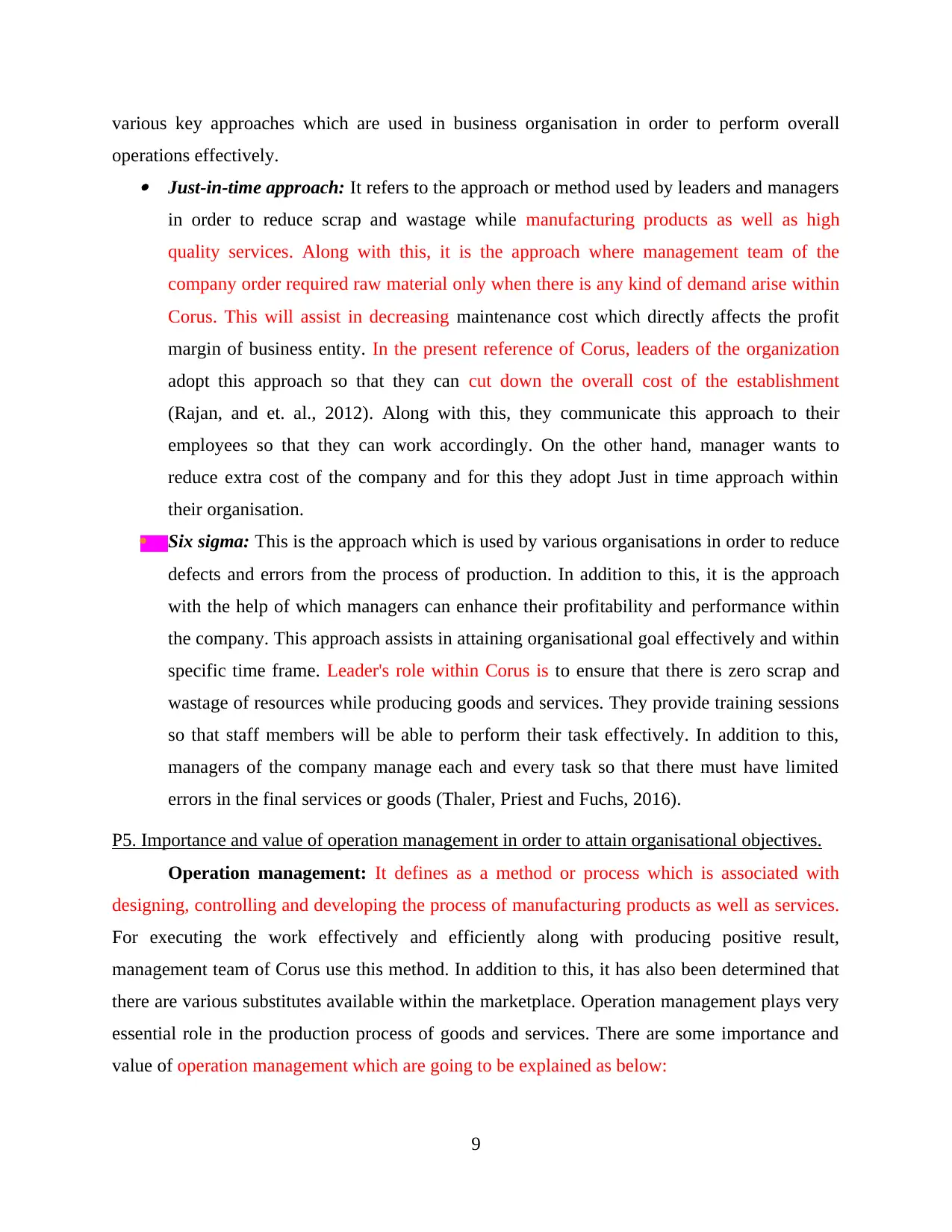
various key approaches which are used in business organisation in order to perform overall
operations effectively. Just-in-time approach: It refers to the approach or method used by leaders and managers
in order to reduce scrap and wastage while manufacturing products as well as high
quality services. Along with this, it is the approach where management team of the
company order required raw material only when there is any kind of demand arise within
Corus. This will assist in decreasing maintenance cost which directly affects the profit
margin of business entity. In the present reference of Corus, leaders of the organization
adopt this approach so that they can cut down the overall cost of the establishment
(Rajan, and et. al., 2012). Along with this, they communicate this approach to their
employees so that they can work accordingly. On the other hand, manager wants to
reduce extra cost of the company and for this they adopt Just in time approach within
their organisation.
Six sigma: This is the approach which is used by various organisations in order to reduce
defects and errors from the process of production. In addition to this, it is the approach
with the help of which managers can enhance their profitability and performance within
the company. This approach assists in attaining organisational goal effectively and within
specific time frame. Leader's role within Corus is to ensure that there is zero scrap and
wastage of resources while producing goods and services. They provide training sessions
so that staff members will be able to perform their task effectively. In addition to this,
managers of the company manage each and every task so that there must have limited
errors in the final services or goods (Thaler, Priest and Fuchs, 2016).
P5. Importance and value of operation management in order to attain organisational objectives.
Operation management: It defines as a method or process which is associated with
designing, controlling and developing the process of manufacturing products as well as services.
For executing the work effectively and efficiently along with producing positive result,
management team of Corus use this method. In addition to this, it has also been determined that
there are various substitutes available within the marketplace. Operation management plays very
essential role in the production process of goods and services. There are some importance and
value of operation management which are going to be explained as below:
9
operations effectively. Just-in-time approach: It refers to the approach or method used by leaders and managers
in order to reduce scrap and wastage while manufacturing products as well as high
quality services. Along with this, it is the approach where management team of the
company order required raw material only when there is any kind of demand arise within
Corus. This will assist in decreasing maintenance cost which directly affects the profit
margin of business entity. In the present reference of Corus, leaders of the organization
adopt this approach so that they can cut down the overall cost of the establishment
(Rajan, and et. al., 2012). Along with this, they communicate this approach to their
employees so that they can work accordingly. On the other hand, manager wants to
reduce extra cost of the company and for this they adopt Just in time approach within
their organisation.
Six sigma: This is the approach which is used by various organisations in order to reduce
defects and errors from the process of production. In addition to this, it is the approach
with the help of which managers can enhance their profitability and performance within
the company. This approach assists in attaining organisational goal effectively and within
specific time frame. Leader's role within Corus is to ensure that there is zero scrap and
wastage of resources while producing goods and services. They provide training sessions
so that staff members will be able to perform their task effectively. In addition to this,
managers of the company manage each and every task so that there must have limited
errors in the final services or goods (Thaler, Priest and Fuchs, 2016).
P5. Importance and value of operation management in order to attain organisational objectives.
Operation management: It defines as a method or process which is associated with
designing, controlling and developing the process of manufacturing products as well as services.
For executing the work effectively and efficiently along with producing positive result,
management team of Corus use this method. In addition to this, it has also been determined that
there are various substitutes available within the marketplace. Operation management plays very
essential role in the production process of goods and services. There are some importance and
value of operation management which are going to be explained as below:
9
⊘ This is a preview!⊘
Do you want full access?
Subscribe today to unlock all pages.

Trusted by 1+ million students worldwide
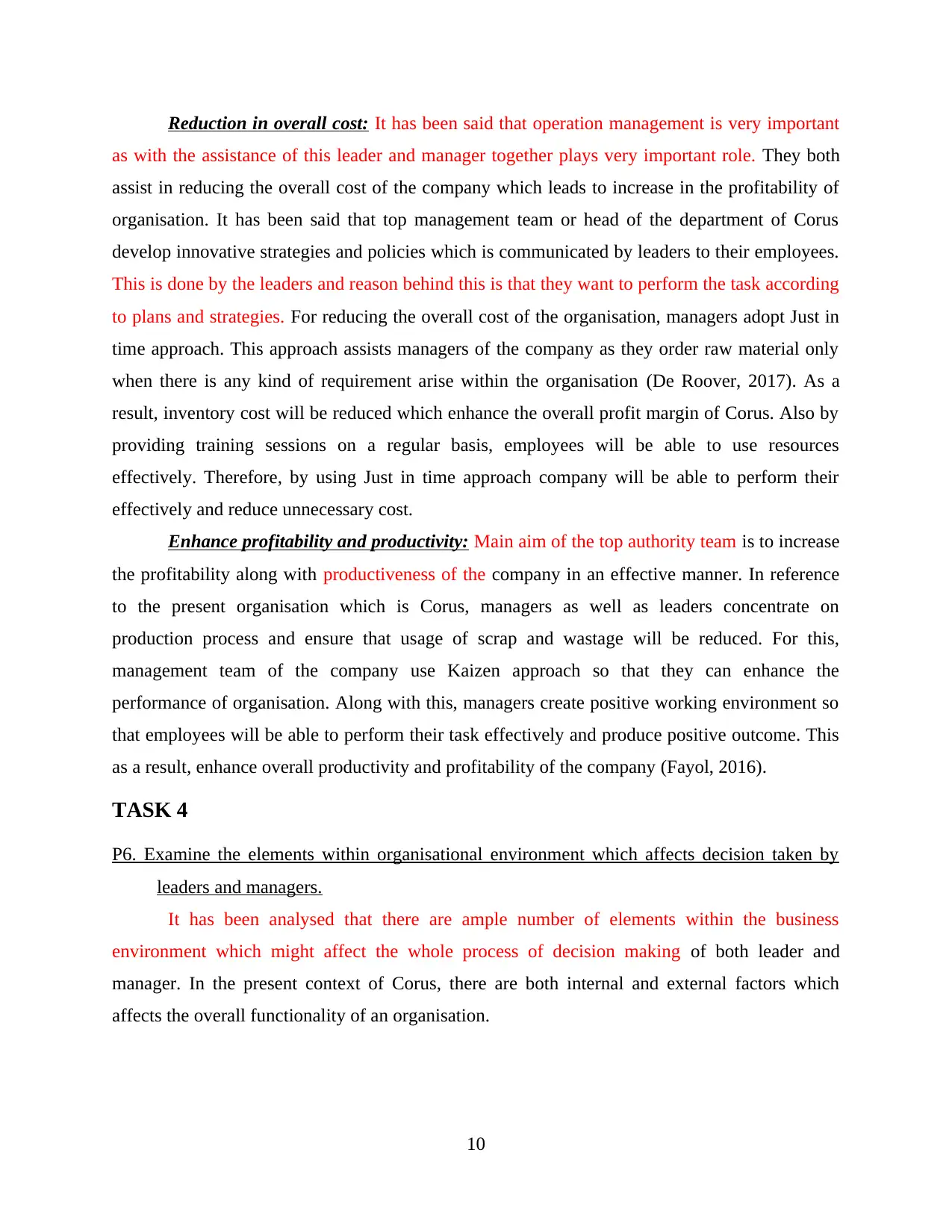
Reduction in overall cost: It has been said that operation management is very important
as with the assistance of this leader and manager together plays very important role. They both
assist in reducing the overall cost of the company which leads to increase in the profitability of
organisation. It has been said that top management team or head of the department of Corus
develop innovative strategies and policies which is communicated by leaders to their employees.
This is done by the leaders and reason behind this is that they want to perform the task according
to plans and strategies. For reducing the overall cost of the organisation, managers adopt Just in
time approach. This approach assists managers of the company as they order raw material only
when there is any kind of requirement arise within the organisation (De Roover, 2017). As a
result, inventory cost will be reduced which enhance the overall profit margin of Corus. Also by
providing training sessions on a regular basis, employees will be able to use resources
effectively. Therefore, by using Just in time approach company will be able to perform their
effectively and reduce unnecessary cost.
Enhance profitability and productivity: Main aim of the top authority team is to increase
the profitability along with productiveness of the company in an effective manner. In reference
to the present organisation which is Corus, managers as well as leaders concentrate on
production process and ensure that usage of scrap and wastage will be reduced. For this,
management team of the company use Kaizen approach so that they can enhance the
performance of organisation. Along with this, managers create positive working environment so
that employees will be able to perform their task effectively and produce positive outcome. This
as a result, enhance overall productivity and profitability of the company (Fayol, 2016).
TASK 4
P6. Examine the elements within organisational environment which affects decision taken by
leaders and managers.
It has been analysed that there are ample number of elements within the business
environment which might affect the whole process of decision making of both leader and
manager. In the present context of Corus, there are both internal and external factors which
affects the overall functionality of an organisation.
10
as with the assistance of this leader and manager together plays very important role. They both
assist in reducing the overall cost of the company which leads to increase in the profitability of
organisation. It has been said that top management team or head of the department of Corus
develop innovative strategies and policies which is communicated by leaders to their employees.
This is done by the leaders and reason behind this is that they want to perform the task according
to plans and strategies. For reducing the overall cost of the organisation, managers adopt Just in
time approach. This approach assists managers of the company as they order raw material only
when there is any kind of requirement arise within the organisation (De Roover, 2017). As a
result, inventory cost will be reduced which enhance the overall profit margin of Corus. Also by
providing training sessions on a regular basis, employees will be able to use resources
effectively. Therefore, by using Just in time approach company will be able to perform their
effectively and reduce unnecessary cost.
Enhance profitability and productivity: Main aim of the top authority team is to increase
the profitability along with productiveness of the company in an effective manner. In reference
to the present organisation which is Corus, managers as well as leaders concentrate on
production process and ensure that usage of scrap and wastage will be reduced. For this,
management team of the company use Kaizen approach so that they can enhance the
performance of organisation. Along with this, managers create positive working environment so
that employees will be able to perform their task effectively and produce positive outcome. This
as a result, enhance overall productivity and profitability of the company (Fayol, 2016).
TASK 4
P6. Examine the elements within organisational environment which affects decision taken by
leaders and managers.
It has been analysed that there are ample number of elements within the business
environment which might affect the whole process of decision making of both leader and
manager. In the present context of Corus, there are both internal and external factors which
affects the overall functionality of an organisation.
10
Paraphrase This Document
Need a fresh take? Get an instant paraphrase of this document with our AI Paraphraser
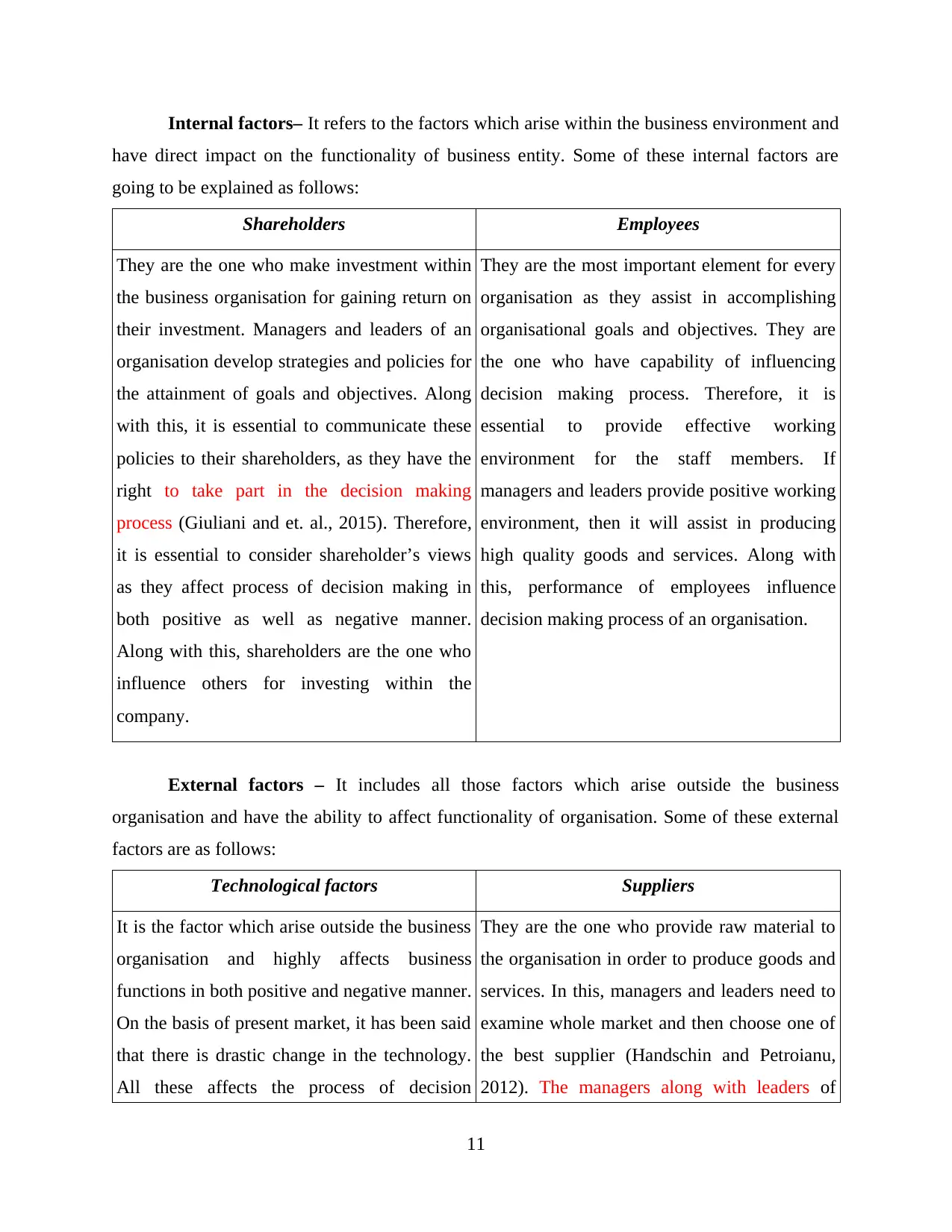
Internal factors– It refers to the factors which arise within the business environment and
have direct impact on the functionality of business entity. Some of these internal factors are
going to be explained as follows:
Shareholders Employees
They are the one who make investment within
the business organisation for gaining return on
their investment. Managers and leaders of an
organisation develop strategies and policies for
the attainment of goals and objectives. Along
with this, it is essential to communicate these
policies to their shareholders, as they have the
right to take part in the decision making
process (Giuliani and et. al., 2015). Therefore,
it is essential to consider shareholder’s views
as they affect process of decision making in
both positive as well as negative manner.
Along with this, shareholders are the one who
influence others for investing within the
company.
They are the most important element for every
organisation as they assist in accomplishing
organisational goals and objectives. They are
the one who have capability of influencing
decision making process. Therefore, it is
essential to provide effective working
environment for the staff members. If
managers and leaders provide positive working
environment, then it will assist in producing
high quality goods and services. Along with
this, performance of employees influence
decision making process of an organisation.
External factors – It includes all those factors which arise outside the business
organisation and have the ability to affect functionality of organisation. Some of these external
factors are as follows:
Technological factors Suppliers
It is the factor which arise outside the business
organisation and highly affects business
functions in both positive and negative manner.
On the basis of present market, it has been said
that there is drastic change in the technology.
All these affects the process of decision
They are the one who provide raw material to
the organisation in order to produce goods and
services. In this, managers and leaders need to
examine whole market and then choose one of
the best supplier (Handschin and Petroianu,
2012). The managers along with leaders of
11
have direct impact on the functionality of business entity. Some of these internal factors are
going to be explained as follows:
Shareholders Employees
They are the one who make investment within
the business organisation for gaining return on
their investment. Managers and leaders of an
organisation develop strategies and policies for
the attainment of goals and objectives. Along
with this, it is essential to communicate these
policies to their shareholders, as they have the
right to take part in the decision making
process (Giuliani and et. al., 2015). Therefore,
it is essential to consider shareholder’s views
as they affect process of decision making in
both positive as well as negative manner.
Along with this, shareholders are the one who
influence others for investing within the
company.
They are the most important element for every
organisation as they assist in accomplishing
organisational goals and objectives. They are
the one who have capability of influencing
decision making process. Therefore, it is
essential to provide effective working
environment for the staff members. If
managers and leaders provide positive working
environment, then it will assist in producing
high quality goods and services. Along with
this, performance of employees influence
decision making process of an organisation.
External factors – It includes all those factors which arise outside the business
organisation and have the ability to affect functionality of organisation. Some of these external
factors are as follows:
Technological factors Suppliers
It is the factor which arise outside the business
organisation and highly affects business
functions in both positive and negative manner.
On the basis of present market, it has been said
that there is drastic change in the technology.
All these affects the process of decision
They are the one who provide raw material to
the organisation in order to produce goods and
services. In this, managers and leaders need to
examine whole market and then choose one of
the best supplier (Handschin and Petroianu,
2012). The managers along with leaders of
11
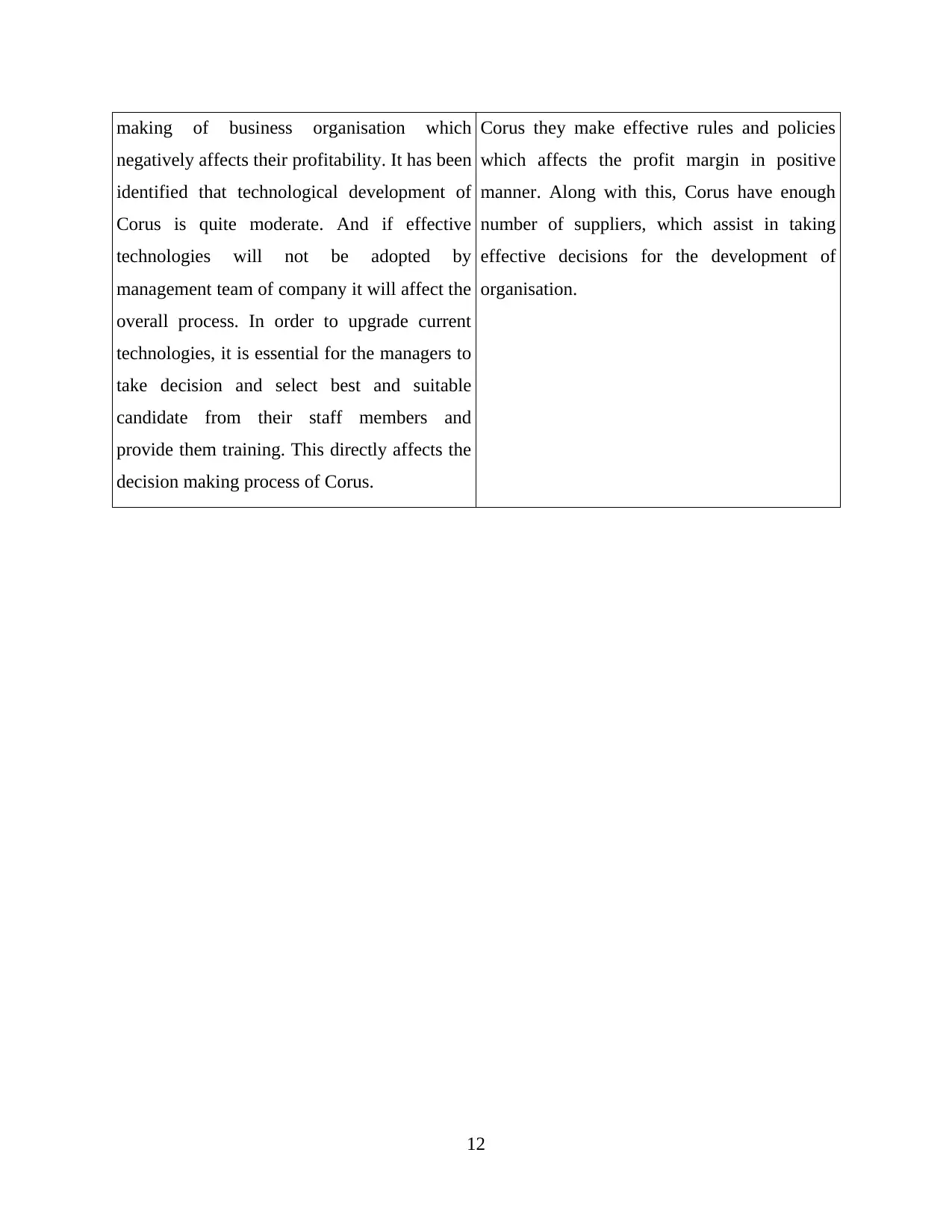
making of business organisation which
negatively affects their profitability. It has been
identified that technological development of
Corus is quite moderate. And if effective
technologies will not be adopted by
management team of company it will affect the
overall process. In order to upgrade current
technologies, it is essential for the managers to
take decision and select best and suitable
candidate from their staff members and
provide them training. This directly affects the
decision making process of Corus.
Corus they make effective rules and policies
which affects the profit margin in positive
manner. Along with this, Corus have enough
number of suppliers, which assist in taking
effective decisions for the development of
organisation.
12
negatively affects their profitability. It has been
identified that technological development of
Corus is quite moderate. And if effective
technologies will not be adopted by
management team of company it will affect the
overall process. In order to upgrade current
technologies, it is essential for the managers to
take decision and select best and suitable
candidate from their staff members and
provide them training. This directly affects the
decision making process of Corus.
Corus they make effective rules and policies
which affects the profit margin in positive
manner. Along with this, Corus have enough
number of suppliers, which assist in taking
effective decisions for the development of
organisation.
12
⊘ This is a preview!⊘
Do you want full access?
Subscribe today to unlock all pages.

Trusted by 1+ million students worldwide
1 out of 15
Related Documents
Your All-in-One AI-Powered Toolkit for Academic Success.
+13062052269
info@desklib.com
Available 24*7 on WhatsApp / Email
![[object Object]](/_next/static/media/star-bottom.7253800d.svg)
Unlock your academic potential
Copyright © 2020–2026 A2Z Services. All Rights Reserved. Developed and managed by ZUCOL.





